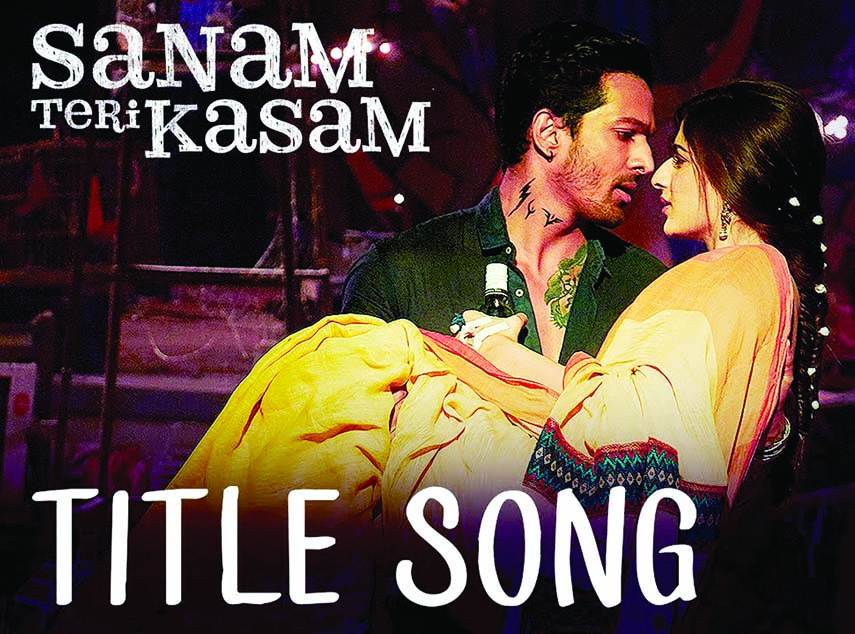
Radhika Rao and Vinay Sapru spin an urban fairytale which, in the name of being a woman-centric film, has one of the most helpless heroines in recent Hindi cinema.
Sanam Teri Kasam is tailor-made for being subjected to, and failing the Bechdel test; a love story that would be any enlightened woman’s worst nightmare. Radhika Rao and Vinay Sapru spin a modern, urban fairytale, albeit a gloomy, miserable one, which, in the name of being a woman-centric film, has one of the most feeble, helpless heroines seen in recent Hindi cinema, one who is let down by people around her, her own destiny and herself.
She is the kind who can’t move even a step forward in life without a man for a crutch. The regressive messages come strongly encoded in the story:
Most men won’t look at you if you are not conventionally beautiful, the man who truly loves you will fathom your beauty despite those thick glasses but you will have to eventually take them off for him as well; and looking pretty is not about feeling good about yourself but for attracting a man and getting married to him.
So you have the plain Jane Saraswati “Saru” Parthasarathy (Mawra), who just can’t ensnare a good match for herself. Her conveniently conservative South Indian family doesn’t help much either.
The mother weeps into her pallu and stays quiet, the authoritarian father, who would typically say thum for tum (you), insists on an IIM-IIT-Brahmin boy for her but, curiously, doesn’t seem as stern when it comes to the younger daughter Kaveri and her boyfriend.
Meanwhile, the spoilt brat Kaveri shouts and screams at Saru because her boyfriend wants marriage and she can’t till the elder sister ties the knot.
“Why can’t you get smart and find a man?” she thunders, while all you want to do is give her one tight slap.
And then a Prince Charming Inder (Harshvardhan) comes to the aid of Saru. There is a romance which blooms, unknowingly to her, book by book (with notes and dried flowers between pages) – from J.D. Salinger’s The Catcher in the Rye to Erich Segal’s Love Story.
He sulks, glares and flares his nostrils to let us know that he is much in love with her. That is when he is not fighting his own inner demons by drinking and sleeping precariously on the building terrace.
Now it’s the turn of Saru’s father go on a rampage, declare her dead for the family and even perform the last rites. If this is the kind of ridiculous, hyper family you are saddled with then it’s better to not have one. But sappy Saru will continue to love them. She will tell her mom not to meet her saying “Woh toot jaayenge” (dad will be shattered).
She is not the only one. Every single woman in the film is utterly inert . Men drive the women’s lives. Even the transformation of Saru is engineered by a man on being prompted by a man. And what an easy transformation it is! Take the glasses off and those ill-fitting khadi suits too and voila! You hoped for some whimsy here, some flight of imagination, but nothing gives.
So all that Mawra as Saru has to do is weep, and then weep some more and keep wiping off the tears from her eyes and cheeks with her hands. Also, it would be interesting to watch the film again to see if there’s any sequence or scene where she has not ended up weeping.
There is a lot of crying, especially towards the end, accompanied with the plaintive sounds of shehnai, otherwise almost a lost instrument in cinema these days. Both the hero and heroine have the most irrational fathers, living on extremes, illogically cussed at the start and unbelievably emotional in the climax. Why there’s even a weeping doctor and a crying cop here! Go with a boxful of tissues if you cry easily at the movies. If you are as cold-hearted as I am you’ll be left scratching your head and perennially looking at the watch hoping for things to wrap up fast. Alas, they don’t.
Directors: Radhika Rao, Vinay Sapru

